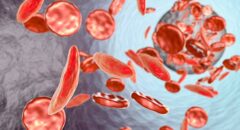
The FDA approved a new drug to treat sickle cell anemia, giving hope to the 100,000 Americans diagnosed with the lifelong disease. This drug is the first new treatment that has been approved for sickle cell disease in the past 20 years.
The drug, crizanlizumab, is produced by Novartis and is clinically proven to reduce the occurrence of pain crisis episodes experienced by those diagnosed with sickle cell disease.
What is sickle cell anemia?
Sickle cell anemia is a lifelong genetic blood disease that affects about 100,000 Americans, with a majority being Black and African Americans. Globally, millions of people are estimated to have sickle cell disease, and diagnosis continues to rise with 300,000 babies born each year with the condition, primarily in Africa and India.
The disease is debilitating and can result in life-threatening complications such as stroke, organ failure, early death and painful episodes, called pain crises. People diagnosed often experience severe pain, stigma, ER discrimination, depression and high medical debt due to related health complications' ongoing medical and hospital treatments.
The only established cure for sickle cell is through a bone marrow transplant (also called stem cell transplant). However, this method is only pursued in severe cases because of limited donors, difficulty finding organ matches, and high risk of death, infection and adverse immune response from the transplant procedure. Currently, the focus is on treatment, primarily hydroxyurea therapy and blood transfusions, to manage the disease and prevent complications, pain crises, and death.
RELATED: Living With Sickle Cell Disease? Here Are The Best Ways To Prevent a Pain Crisis
Crizanlizumab is clinically proven to reduce the frequency of pain crises
Crizanlizumab is administered by injection into a vein. It was approved by the FDA as a safe and effective treatment for sickle cell disease based on a 52-week (approximately one year) randomized controlled clinical trial with a sample size of 198 patients. Compared to a placebo (inactive treatment), crizanlizumab reduced the frequency of crises by 45%. The drug also reduced the annual average days spent in hospitals to 4 days compared to the 6.87 days experienced on the placebo.
The reduction of hospital emergency room visits and pain crises might reduce the quality of life burdens experienced by people diagnosed with sickle cell anemia. However, due to the small sample size and limited study length, real-world data will continue to be collected to monitor its larger-scale effectiveness, cost-effectiveness and side effects.
Without health insurance, the drug retails for about $9,000 - $10,000.
Side effects of crizanlizumab
Within 24 hours of administering crizanlizumab, the following side effects may occur:
- Nausea
- Fever
- Tenderness and pain in various locations (joint pain, back pain, abdominal pain)
- Chills and shivering
- Vomiting
- Diarrhea
- Tiredness
- Dizziness
- Hives and itching
- Shortness of breath
You should monitor and discuss your side effects with your healthcare provider.
How to know if you have sickle cell disease
Symptoms of sickle cell anemia typically begin in early childhood and vary from person to person. The United States Preventive Services Task Force recommends sickle cell testing be conducted in newborn screenings.
Sickle cell disease is inherited, and it is not possible to get sickle cell anemia from environmental factors or contract it from someone with the illness.
Genetics to Diagnosis: How Sickle Cell Comes to Be Real
The only way to have sickle cell disease is to inherit both sickle cell traits from your parents. Both parents would need to have sickle cell trait (hemoglobin S), the genetic mutation, to give birth to a child with sickle cell disease.
If only one parent has the trait (hemoglobin S) and the other does not, although the child may be born with sickle cell trait, they will not be born with sickle cell disease. With the exception of rare cases, having the sickle cell trait is generally a harmless condition.
A blood test is required to diagnose sickle cell disease and screen for the sickle cell trait. The main symptoms of sickle cell disease include:
- Anemia and fatigue: Due to the average 10-20 days lifespan of sickle-shaped red blood cells, opposed to the usual 120 days for disk-shaped cells, people with sickle cell disease often experience a chronic shortage of red blood cells (anemia). This low red blood count results in constant exhaustion (fatigue).
- Acute pain and swelling: The main symptom of sickle cell anemia is periodic episodes of acute pain called pain crises. The sickle-cell shape is inefficient at flowing through the body. This causes clotting and the cells getting stuck, resulting in inflammation (swelling), organ damage, and chronic pain that can last a couple of hours to over a week.
- Delayed puberty: The low blood count and sickle-cell shape cause low oxygen and nutrient flow throughout the body. For infants and children, this results in slowed growth and development. Whereas in teenagers, it might display as delayed puberty.









